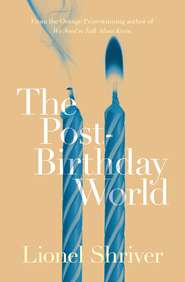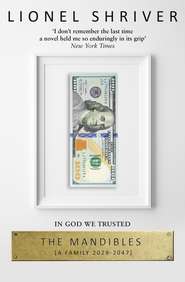По всем вопросам обращайтесь на: info@litportal.ru
(©) 2003-2024.
✖
Ordinary Decent Criminals
Автор
Год написания книги
2018
Настройки чтения
Размер шрифта
Высота строк
Поля
“No,” she exhaled, remembering. “And today Kieran asked me to manage the Green Door.”
“How did you pull that off?”
“Damned if I know! It’s out of control! Everywhere I go I just want to be a schlemiel and somebody hands me a set of keys and the books, and before long I have employees and late hours and a lot of problems. It’s the curse of the crudest possible intelligence. The fact is, if you tell a hundred people, Put the chair in that corner, fully seventy-five of them will promptly hang it from the chandelier. Did you know that most of the world is made of fruitcakes?”
He laughed. “You get more American when you drink.”
“I can’t help it. I was born this way.”
“You don’t like being American?”
“I’ve learned to get by with it, like any handicap—harelip, paraplegia. Do you like being Irish?”
“What do you think?”
She eyed him. “That you abhor it. In short, Ireland suits you perfectly.”
She was getting swacked. Her voice was louder and higher; people were looking over at their table. She used her hands when she talked, and as her motions got wider Farrell eyed their tall goblets warily, though she always missed. Then, she knew her way around a landscape with glasses, that was clear. She had reached a phase he knew himself, marked not by sloppiness but by inordinate precision—her pronunciation was getting more rather than less correct. Her phrasing grew considered, her gestures semaphoric, crisp as air traffic control. When she rose to find the loo, he recognized the careful placement of her hand on the table, the excessively smooth ascent from her chair, the purposeful step-by-step glide around other diners—too exact, too concentrated. She had crossed the point where all these ordinary matters could be executed without thinking, and now to negotiate finding the ladies’, asking Maire coherently, remembering the directions and being able to follow them, took the full application of her powers.
Farrell enjoyed her absence. He kneaded his forehead. He had to admit he’d no idea what to make of her. The boasting had been a bit much; though if she really had washed dishes in the Philippines and made plastic boots in Galilee, he supposed she deserved a little airtime over dinner for work that had surely been excruciating after the first half hour. Farrell was tired. That was it, she was tiring. He wished she would just quiet down. He was sick of words. This whole island never shut up, and he wondered at how much people said was in such reliably inverse proportion to how much they had to say. If Farrell chose to lose any of his senses, he decided he’d go deaf.
Yet when Estrin returned it was as if something had happened. She seemed sad. He felt sure he could make one mean remark and she would cry.
“Are you married?” she asked straight up.
“You know when I woke up at thirteen, but you can’t tell if I’m that much of a shite?”
“That’s right,” she said calmly. “Only the incidentals of your life are apparent.”
When the bill came and Farrell went for his wallet, Estrin crumpled into her pocket for a wad of pound notes. “No, no.” He put a hand over her fist of cash. He flicked a card to Maire, allowing Estrin to catch that it was platinum.
Farrell gave her a hand up, pressed gently at her waist between tables; opening the door, he slipped his fingers under a shock of hair still beneath the jacket and pulled it free; she paused to let him finish, and a little longer still for the back of his hand to rest at her collar. As a result, by the time they were outside they had run through all the routine moves of the gambit like speed chess. Then, she was thirty-two, he forty-three; openings had become so easy. Perhaps the very definition of adulthood is a fascination with the middle parts of games.
“I have my bike,” she said.
“It’s safe?”
“Locked, anyway. I suppose.”
“Leave it, then. We haven’t far.”
Estrin shot her motorcycle a mournful look. “Where to?” she asked, in tow.
“My hotel.”
“You live in a hotel?”
“No.”
“Then why—”
“It’s safer.” To Estrin’s grunt of incomprehension, he simply replied, “Never mind.” He put his arm around her shoulders, though at Estrin’s height that was less like holding a person than resting on a banister.
“The swallow,” he told her as if beginning a bedtime story, “takes off when it’s young and flies all around the world. For up to four years it never lands, sailing over South America, Africa, Australia—thousands of miles, the circumference of the earth several times.”
“Does it mate in the air?”
“No, after sowing wild oats in Tierra del Fuego, the swallow settles down to raise a family. Buys a station wagon and gets fat.”
“Thanks,” said Estrin.
While no longer rolled up by dark as it once was, central Belfast was deserted after the pubs closed; their heels rang down the walk.
“Another parable,” said the American, whose voice, cowed by quiet, had gone soft. “A few years ago back in Philadelphia I decided I was sick of my ratty underwear—it was stained, the elastic shot. So I treated myself to, like, the best—in one store, silk, maroon, black lace; as my stack piled down the rack, other customers began to stare at me sidelong. I bought thirty pairs. When I got home I spread them out and not only felt insane, I felt deprived. All I could think about was going out and buying more.”
“You’re obsessive.”
“Not so simple. It’s greed. The same thing happens when I’m not halfway through a meal and I start thinking about a second helping. Or a cassette’s not nearly over and I decide to play it again. It’s a hunger like C. S. Lewis’s magic Turkish delight: the more you eat, the more you want, because you didn’t taste what you had before. When I decide in the middle to play a song again, I stop hearing it the first time. I have a problem with wanting what I’ve already got.
“Anyway, that’s what happens with me and maps,” she explained. “I spread them on the floor like underwear. I no sooner get my butt to Belfast than I start frantic plans to fly to the Soviet Union.”
“Still have the silk drawers?” He raised his eyebrows.
“Nope. After the shopping binge I stopped wearing underwear altogether.”
She couldn’t match his stride, and kept trying different rhythmic combinations, 3:2, 5:3, like solving an equation, and now tangibly hung back. “Listen,” she fumbled. “I don’t do this sort of thing much anymore.”
He stopped and kissed her hair. “Now, what sort of thing might that be?”
“I guess that’s my question.”
“Always in such a rush. Don’t we need something to discuss before we can discuss it?”
“Sorry. You make me nervous. I don’t know why.”
He liked her for the confession. He took her hand, swinging it a little, feeling … content. A mysterious sensation.
chapter five (#ulink_998029b8-bed9-5f40-b7a8-75ece63414fa)
Cape Canaveral on York Street (#ulink_998029b8-bed9-5f40-b7a8-75ece63414fa)
Estrin was pleased he led her to Whitewells, old Belfast, one of the last monuments downtown to an era largely expunged in the last twenty years blast by blast. At the corner of Royal Avenue and York Street, its Edwardian opulence put the rest of the town center to shame. The “Belfast Is Buzzing” campaign proudly celebrated a commercial reincarnation not unlike having been born a prince and coming back a sow. The lines of shoe stores and garish plastic marquees may have made locals proud, but they made Estrin feel temporary, trivial; she might have preferred the atmosphere had the shops remained bombed out. Yet only a few chipped stones on the hotel suggested nearby explosions; more than its architecture, what impressed Estrin most as they walked in was that Whitewells was still here.
Not that they got far. Two steps in, they were met by a security façade more imposing than at most airports. While the doorman respectfully recognized “Mr. O’Phelan,” even Farrell laid his jacket on the X-ray belt, walked through the metal detector, and raised his arms to be searched. For the first time in this Province, Estrin’s adorable round cheeks didn’t roll her past the guards. They impounded her can of Mace, and a far more than perfunctory frisk recovered a Phillips screwdriver Estrin had rummaged for all week. They took that, too.
“Jesus,” Estrin exclaimed when they were through. “I’d hate to see what they do to suitcases.”
“Something between homogenization and genetic engineering. If Watson hadn’t discovered DNA, Whitewells would have found it at the door. Best security in all of Europe.” He clapped her delightedly on the shoulder and left for the key.











